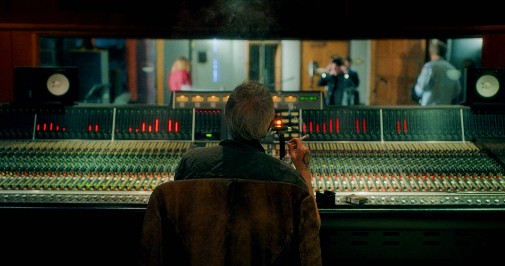
On December 21st, the Academy will announce their shortlists in several categories, including Best Original Song. As usual, some mainstream triumphs feel like locks already, maybe not for the final lineup but certainly the roster of 15 finalists. Even before the movie was released, Billie Eilish had already won a Grammy for her Bond theme, "No Time to Die." Beyoncé seems like an inevitable nominee thanks to King Richard's "Be Alive." As for Lin-Manuel Miranda's work for Encanto, it's never a good idea to bet against Disney. In the midst of it all, the weird glory of Leos Carax's Annette may be forgotten, despite its vast score of original songs by the Sparks (Ron Mael and Russell Mael). Please, dear reader, allow me to make the case for that musical's first and best tune…
First up, let's set the scene. No, not the beginning of the movie. Instead, it's the beginning of my return to the movies, after months away from theaters. Apologies for the navel-gazing nature of these musings, but to explain why this song works so splendidly, it's essential to reflect upon its impact on the viewer. In any case, it was July 6th, the day the 74th Cannes Film Festival started. Leos Carax's first feature since Holy Motors was going to open the festivities, and, by some marvelous miracle, the Portuguese press got to see the flick on that same day. As someone who's used to never getting a taste of Cannes competition titles until months after their Croisette premiere, I was excited beyond belief.
Indeed, so great were my expectations that I decided to go to the Annette screening, my first of 2021. The siren call of Carax was too strong to resist, as was the love of musicals, the devotion to Adam Driver's idiosyncratic hotness, and Marion Cotillard's silent movie star eyes. And yet, there was fear and trepidation, impossible to ignore, an undercurrent of anxiety rumbling below the excitement. In this storm of conflicting emotion, eyes fixed on that bright wall in a dark room, I let myself be overwhelmed by the miracle of cinema, of the theatrical experience. Said miracle manifested first in sound, sonic waves visualized as red spikes over a Hollywood street. Pushing in, the camera enters a studio, a space of creation where Carax and his daughter wait.

They wait for the magic to start, for the musical to start singing and the screen to vibrate resurrected, reawakened from a long slumber. When it does, the tune takes the form of a question – "So, may we start?" The repeated verse and intersection of French cinema with English idioms make for a nifty wordplay, by which each question answers back to its twinned predecessor. "May we start? Mais oui." Indeed, it's time to start, high time to start, though some confessions are prerogative as the performers take their places and the orchestra their seats. There's a lot of hope going around, but it comes with fear. Everyone is underprepared since the project's so ambitious, and the budget, while large, is not enough. The sea storm shall be projection, and the baby actors shall be replaced with props, in other words.

Still, they're here for us, for performance art needs an audience. The newfangled new-fashioned worlds are built for the people sitting in the dark, waiting. They're waiting for song and fury. Considering this is a Cannes opener helmed by one of the great provocateurs of modern cinema, they also expect no taboos, please. If the spectator is generous enough, the artists will do anything for them, from creating cosmos out of fiction, out of lies, to die in minor key and kill, if necessary. The screen is a portal, the screening room a temple. So, close the doors, and understand you're the god being honored in this realm. Carax shall eviscerate himself for you, and so will his players, but they beg for mercy. Don't show disdain, especially if you're at a festival and authors are there. Artists are a little vain, and there's no point in hiding it.
So, close the doors and let it start, flames lit and sound resounding. On screen, continuous takes go from the recording booth to the streets, each step bringing a new player. First, there are the writers and composers, then the backup singers, the actors – Driver! Cotillard! Helberg! – the director, even a children's choir. It feels as if we're watching an improvisation, though it's all too perfectly imperfect for that to be the case, too complex too. Facing this spectacle, the audiences must shut up, enjoy the silence and sit down. This isn't a proscenium of an old opera house, but there are still rising curtains. They're skin-like rather than red velvet. They're your eyelids, steadily rising to absorb what's coming your way. It's a freight train of enthusiasm and experimentation, ready to crash.

The stage is within, maybe outside. It doesn't matter. What's important is that we're back in the temple of cinema and it's time to start, to pray, to celebrate. What a fantastic feeling it is. So great, it was capable of dispelling my anxieties that June morning and making me feel magical miraculous and welcomed back into my favorite place. Those might not have been the intentions of Carax, nor the Sparks. Still, I couldn't help but listen to their music as an overture for the experience of watching a film, any film. A homecoming hymn celebrating the return to something lost – to something that remains at risk in a world where congregating outside one's home remains dangerous.
Still, cinema is cinema outside or within, and Annette remains magical in all its messy lunacy. Maybe the Sparks' composition isn't for everyone, but "So May We Start" is, to me, the best movie song of the year. Let's hope enough Academy members agree.

Annette is streaming on Amazon Prime Video.